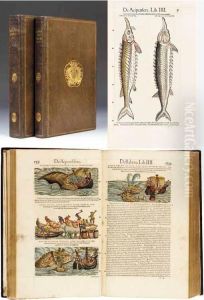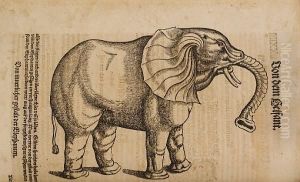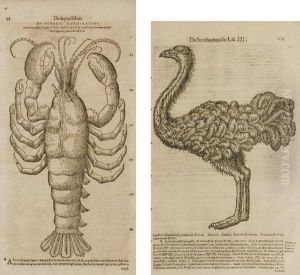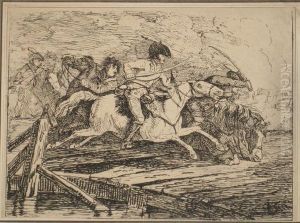Conrad Gesner Paintings
Conrad Gesner was a Swiss physician, naturalist, bibliographer, and philologist, born in Zurich, Switzerland, in 1516. His extensive work and studies spanned across various fields of natural science and the humanities, making him one of the most versatile scholars of the Renaissance. Gesner is often considered the father of modern zoology and was one of the first to integrate firsthand observation with classical knowledge in his descriptions of the natural world.
Gesner's most renowned work is 'Historiae animalium' (History of Animals), a monumental five-volume encyclopedia published between 1551 and 1587, which attempted to compile all known information about animals, including descriptions, illustrations, and even folklore. This work is notable for its attempt at a systematic classification, combining ancient and medieval texts with his own observations. It was among the first zoological works to include illustrations alongside the descriptions, making it an invaluable reference that influenced generations of naturalists, including Carl Linnaeus, the father of modern taxonomy.
In addition to his contributions to zoology, Gesner was a polymath who wrote more than 70 books on various subjects including botany, medicine, and languages. His 'Bibliotheca universalis' (1545), a bibliographic catalogue listing all authors alphabetically with their works that had been printed by that time, was an ambitious project that aimed to encompass all knowledge. This work is considered one of the first attempts at a universal bibliography and marked a significant contribution to the field of information organization.
Gesner's interests also extended to the study of mountains, and he is often credited with being one of the pioneers in the field of mineralogy and paleontology. His work in these areas laid the groundwork for future scientific exploration and study.
Despite his significant contributions to science and the humanities, Gesner's life was marked by the religious turmoil of the Reformation, which impacted his academic career and personal life. He died in Zurich in 1565, likely from the plague. Conrad Gesner's legacy is that of a scholar who sought to document and understand the natural world comprehensively. His work bridged the medieval and modern worlds, paving the way for the scientific revolution that would follow.



